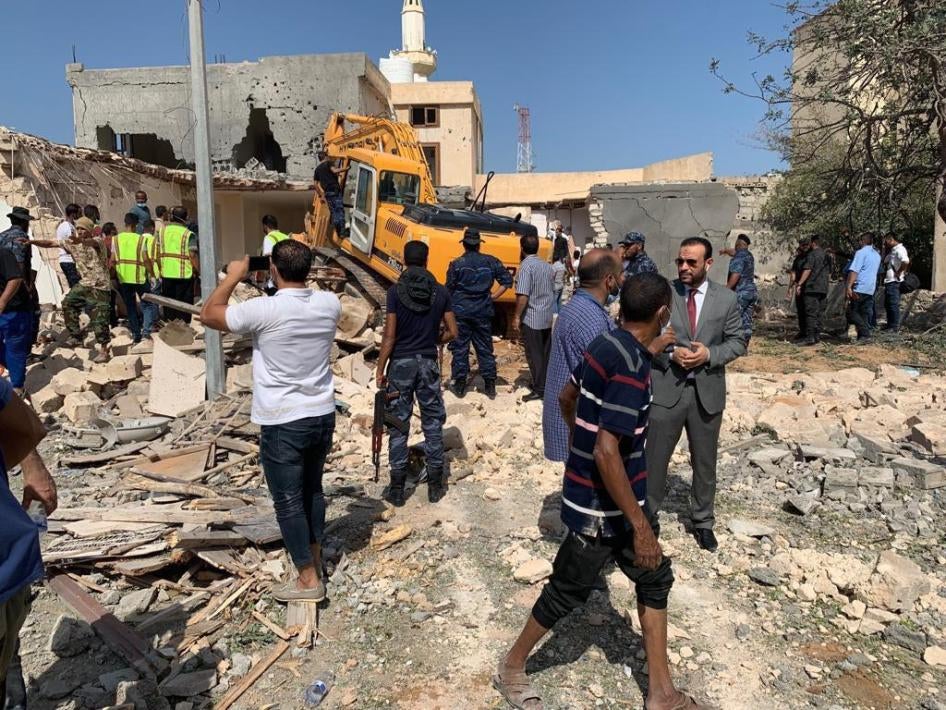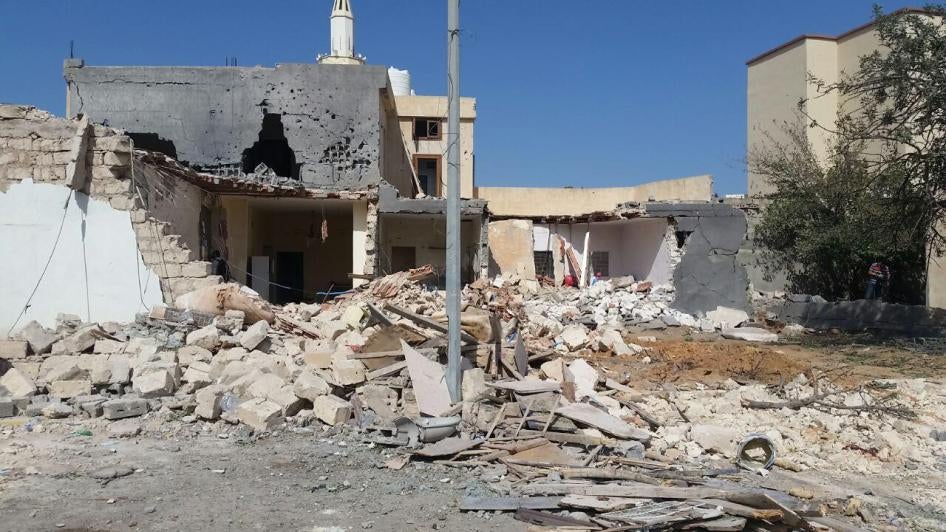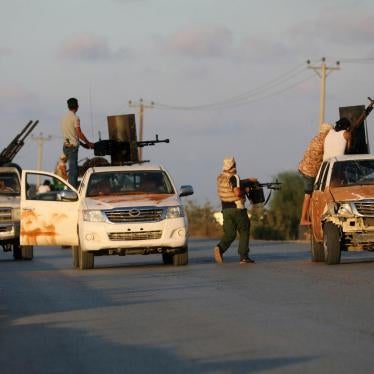(Beirut) – An airstrike by the Libyan National Army (LNA), on a home in a residential area of Tripoli on October 14, 2019 that killed three girls and wounded their mother and another sister, is an apparent violation of the laws of war, Human Rights Watch said today. This attack on civilians is one of many that require an impartial and independent investigation to attribute responsibility and hold those responsible to account.
Under the command of General Khalifa Hiftar, the armed group LNA and affiliated forces have conducted a series of air strikes that resulted in civilian casualties. They began a military campaign in April to conquer the capital, Tripoli, from forces affiliated with the Tripoli-based and internationally recognized Government of National Accord (GNA).
“General Hiftar and his forces have repeatedly shown their disregard for civilians’ lives with disproportionate or indiscriminate attacks against civilians and civilian structures,” said Eric Goldstein, deputy Middle East director at Human Rights Watch. “There is a dire need for an independent UN investigation to attribute responsibility for these airstrikes and ensure justice for war crimes and compensation for the victims’ families.”
In the October 14 airstrike, the LNA destroyed a home in the al-Fernaj residential neighborhood of Tripoli, and killed three sisters, ages 4, 5, and 7 and injured another sister, age 3, and the girls’ mother, said a statement by the GNA-aligned Tripoli military operations coalition Volcano of Rage, which is fighting the LNA The statement identified the casualties by name. An LNA spokesman, Ahmed al-Mismari, said that the airstrike targeted a “terrorist operations room” and denied targeting civilians.
The LNA that is supported by the Interim Government in eastern Libya has consistently denied causing civilian deaths despite mounting evidence of their responsibility.
The UN has said that fighting between the two groups in and around Tripoli has, since April, killed at least 100 civilians and displaced 120,000.
The GNA in a statement blamed the LNA for the attack, as did the United Nations Mission in Libya, while the United States embassy attributed it to the “forces laying siege” to Tripoli.
Human Rights Watch spoke by phone with Husam Alter, a Tripoli resident who witnessed the airstrike and who was among the first responders to the incident, and with Osama Ali, the spokesman for the Tripoli Ambulance and Emergency services. Alter, who was on private business in the area, said he noticed at around noon a fighter jet circling for several minutes above the area, then dropping a bomb on a private house in a busy residential area. He said he ran toward the home and saw a large plume of smoke rising.
“As I arrived at the house, which consisted of two floors and a small annex, I saw that it had been completely destroyed,” he said. People had just started to clamber onto the debris to check for survivors. The father was outside with one of the girls, who was covered in gray dust, but he left quickly to take her to hospital. One of the neighbors said there were three more children in the house and other people and I started to remove the stones and debris with our hands until the ambulance and security services arrived.”
He said he left when relief services with a digger to came to search for the survivors as he could no longer see because of dust in his eyes.
Ali said that the Ambulance and Emergency Services recovered the bodies of the three sisters from the debris. He said that the family had been renting the house temporarily after being displaced from their own home in the Khila area in the southern suburbs of Tripoli due to the ongoing fighting.
Both men said that a fighter jet struck the house. Photographs and videos of the scene that Human Rights Watch reviewed showed damage consistent with an air-delivered munition.
The targeted house was about 20 meters from a compound belonging to Military Intelligence, Alter and Ali said. Some local sources said the compound, which seemed not to have been damaged, was not in use.
Mustafa al-Majae, spokesperson for the Tripoli military operations command, told Human Rights Watch that the compound adjacent to the house that was struck had been an administrative building for the military command, which owns it. He said that the compound was currently not in use and had no role in the military counteroffensive against the LNA. The LNA has produced no evidence showing that it was a military target justifying it being targeted despite being in a civilian neighborhood.
Both Alter and Ali said they did not see any military equipment in or around the house that was struck. Photos and videos of the attack reviewed by Human Rights Watch appear consistent with these statements.
Under the laws of war, civilians and civilian objects may never be the object of attacks. Warring parties are required to take all feasible precautions to minimize harm to civilians and civilian objects and to refrain from attacks that would disproportionately harm the civilian population or fail to discriminate between combatants and civilians.
The laws of war also prohibit disproportionate attacks, attacks that cause loss of civilian life or damage to civilian objects that would be excessive in relation to the concrete and direct military advantage anticipated from the attack.
While Human Rights Watch could not confirm the status of the compound next to the targeted house, the GNA is obligated as a matter of principle to ensure that no civilians are adjacent to operational military facilities, given the heightened risk of their being in the line of fire.
Since April 4, Human Rights Watch has documented other LNA strikes that resulted in killing or injuring civilians and destroying homes and civilian structures with apparently no measures taken against those responsible and no compensation or payments to civilians. These attacks included a strike against a migrant detention center in Tajoura in July that killed 46 civilians
On October 6, the LNA attacked the Janzour Equestrian Club in the Janzour area of Tripoli, injuring six children and killing several horses. UN staff conducted an assessment to identify the targeted site and the nature of the attack and, blaming the LNA, found that “a fighter jet had dropped four unguided bombs on the Equestrian Club, a civilian facility, and that neither military assets nor military infrastructure were observed at the targeted site.”
Fighters affiliated with the LNA have a well-documented record of summarily executing civilians and fighters; forcibly displacing, torturing, and disappearing people; and carrying out indiscriminate or disproportionate attacks that have harmed civilians. Armed groups affiliated with the GNA also have a record of abuses including summary killings of captured fighters, arbitrary detention, forced displacement, torture, and disappearances.
Due to the partial collapse of the domestic criminal justice system, Libyan authorities have failed to investigate or prosecute those responsible for grave abuses. The prosecutor of the International Criminal Court (ICC) has a mandate to investigate war crimes, crimes against humanity, and genocide in Libya, since 2011. The court has recently issued two arrest warrants for Mahmoud el-Werfalli, a commander linked to the LNA, for the war crime of murder related to incidents between June 2016 and January 2018.
Saif al-Islam Gaddafi also continued to be subject to an ICC arrest warrant for his alleged role in attacks on civilians during the country’s 2011 uprising. The ICC also issued an arrest warrant for Al-Tuhamy Mohamed Khaled, a former official in the Gaddafi government, for crimes against humanity and war crimes committed in Libya between February and August 2011. Their whereabouts remain unknown.
The United Nations has imposed a sanctions regime and arms embargo on Libya but has not effectively used them to punish those who commit gross human rights violations.
Given the current state of impunity in Libya, there is a dire need for an international inquiry, such as by an independent commission of inquiry or similar entity, with a mandate to impartially document abuses, identify those responsible for violations, and publicly report on the human rights situation in Libya, Human Rights Watch said. An upcoming opportunity to establish such an investigation will be during the March 2020 session of the UN Human Rights Council. Ghassan Salameh, the UN special representative to Libya; the Office of the High Commission for Human Rights; and several European governments have already endorsed such a move.
“There needs to be a much stronger focus on justice and accountability in Libya to deter further crimes,” Goldstein said. “As the attacks continue, civilians – and in this case small children – pay with their lives.”









